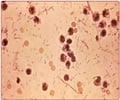American researchers have said that the rapid decline of coral ecosystems could partly be attributed to two new viruses.

The research was published today in the ISME Journal, in work supported by the National Science Foundation.
"We're way behind in our knowledge of how viral disease may affect coral health," said Adrienne Correa, a researcher with the Department of Microbiology at Oregon State University. "If viral infection is causing some bleaching, it could be important in the death of corals and contribute to reef decline. This potential threat from viruses is just starting to be recognized."
Corals co-exist with these algae in a symbiotic relationship, scientists say, in which the algae provide energy to the coral, and contribute to the construction of reefs. The coral in turn offers a place for the algae to live and provides nutrients for it.
Corals and viruses have evolved along with their resident algae for millions of years. They have persisted through previous climate oscillations, and the presence of viruses within corals or their algae doesn't necessarily indicate they are affecting coral colony health. If viruses are causing disease or bleaching of colonies, it's also unknown whether this is happening now more than in the past.
"Corals are known to face various environmental threats, such a warming temperatures, competition and pollution," Correa said. "Some of the environmental changes of the past were likely more gradual and allowed the coral and its associates more time to adapt.
Advertisement
In continued research at OSU, scientists will inoculate Symbiodinium with the viruses and try to prove they are causing actual disease. If the viruses are killing the algae, scientists said, it could have significant implications for coral reef health and survival. There are almost two dozen known diseases that are affecting coral, and scientists still do not know the cause of most of them.
Advertisement
Source-Eurekalert










